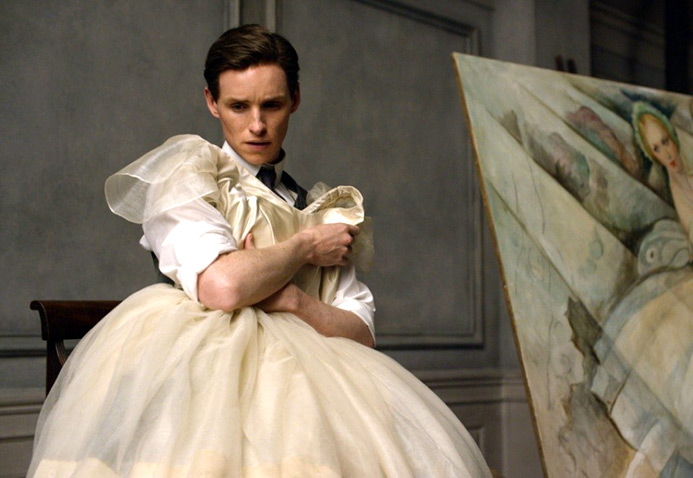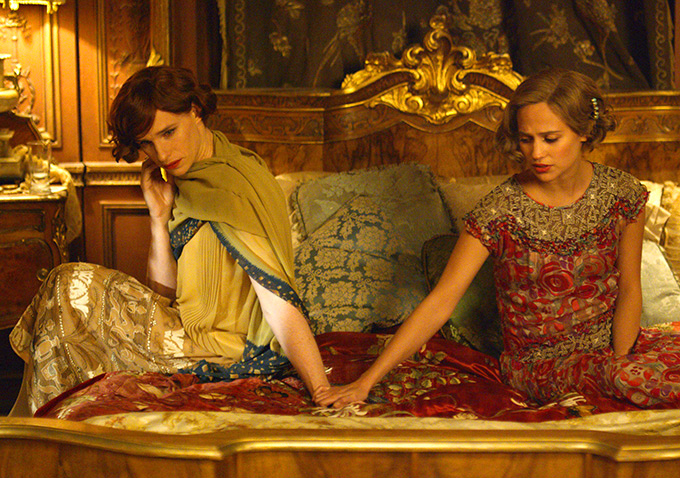By providing your information, you agree to our Terms of Use and our Privacy Policy. We use vendors that may also process your information to help provide our services. This site is protected by reCAPTCHA Enterprise and the Google Privacy Policy and Terms of Service apply.
Eddie Redmayne Talks Backlash, Trans Representation and the Power of the Male Gaze in ‘The Danish Girl’
Kristy Puchko

READ MORE: Watch: Love Transcends Gender For Eddie Redmayne and Alicia Vikander in ‘The Danish Girl’ Trailer
English ingendude Eddie Redmayne has never shied away from
challenging material. Whether that means singing live one of Broadway’s most iconic
numbers take after take for Tom Hooper’s “Les
Miserables,” physically transforming himself to mirror the Stephen
Hawking’s deteriorating health in James Marsh’s “The
Theory of Everything,” or playing a grandiose extraterrestrial tyrant
in Andy and Lana Wachowski’s “Jupiter
Ascending,” Redmayne relishes the chance, and often thrives. Earlier this year, the Hawking
biopic earned Redmayne his first Academy Award. And “Jupiter
Ascending,” well, it failed in theaters, but has cemented Redmayne new
fans with his performance’s cult appeal.
He’s following this up with his greatest artistic risk yet.
Reteaming with Hooper for “The
Danish Girl,” Redmayne offers a daring performance, stepping into the
elegant shoes of Lili Elbe, a pioneer of the transgender movement who carved
her path of transition in a time before there was even had a word to define it.
In early ’20s Copenhagen, no couple is as chic or besotted with each other as
married artists Einar and Gerda Wegener. But their marriage must transform as
Einar identifies the desire to become a woman, to become Lili, who became a
muse to the devoted Gerda (Alicia Vikander).
This is not the first time Redmayne has played a female
role. But with trans awareness on the rise, the casting of this cisgender male
actor was met with some criticism. When Indiewire recently spoke with Redmayne on the
phone about “The Danish Girl,” we asked for his response to his
casting backlash, his thoughts on Lili, the burden of representation, what it
was like to feel the weight of the Male Gaze for the first time, and how
playing a woman has affected him personally.
What attracted you to
Lili’s story?
You know I was given this script when I was making “Les
Miserables.” Tom Hooper, the director, gave it to me and when I read it I
had no knowledge or no insight into anything about what the story was until I
read it. I find it an incredibly unique love story and a passionate love story,
but also a story about authenticity. And I couldn’t believe I didn’t know
anything about Lili’s story. I suppose what I tend to react to in a script is
something instinctive. When I began to research around it, I thought it would
be a great privilege to play her.
Tom Hooper said you
also spoke with Lana Wachowski about this film.
I was cast by Tom during “Les Miz” four years ago,
but (“The Danish Girl”) didn’t have financing. And so it was slightly
on the backburner. So when I was working with Lana (on “Jupiter
Ascending”), I mentioned Gerda and Lili’s story and Lana talked so passionately and beautifully about
Gerda’s artwork, and the paintings of Lili, and “Man Into Woman,” the
book that was published after Lili’s death. And she pointed me to where to
start educating myself, specifically to Jan Morris’s book
“Conundrum,” and a book by Kate Bornstein called “Gender
Outlaw.” So, she really started my education I suppose.
You’ve done biopics
before (“My Week With Marilyn,” “Elizabeth: The Golden
Age,” “Theory of Everything”), but with the trans community
having a moment right now, how was the weight of bearing the burden of
representation different here?
It’s interesting because you mention the burden of representation.
For me it’s about–I knew that Lili was an icon and that Gerda and Lili’s story
is incredibly special. And getting to play her was a great privilege. And with
that responsibility — I suppose to a similar way that I found playing Stephen
Hawking a year or two ago when I knew that Stephen would see the film
(“The Theory of Everything”) and it was based on Jane’s book, there
would be the ultimate judge. What it does is it just galvanizes you to work harder and to do as a thorough and as good a
job as you can. Beyond that I suppose, that was all I could do. And I hope I’ve
done an okay job.

Well, you’ve been
attached to this project for a while, but the public only became aware of your
casting a year and a half ago. There’s been an argument about whether or not a
cisgender male “should” play a trans woman. What was that like for
you, and what is your response to that criticism?
I think it’s incredibly important discussion. And I think
it’s also representative of a lot of discrimination against trans people in the
work place generally. I think there has been years of cisgender success on the
back of trans stories. But I know that Tom when he was making this film — many
trans people worked on the film. One trans actress Rebecca Root plays a cisgender nurse
in the film. My first-ever professional job was playing Viola in “Twelfth
Night.” And last year I went to see a production of “Julius
Caesar” in London that had an all-female cast.
And for me, I hope there’s
a day when there are more trans
actors and trans actresses playing trans parts, but also cisgender parts. And I
hope — as an actor one hopes — that one should be able to play any sort of part if one plays it with a
sense of integrity and responsibility.
Is it helpful or
hurtful to hear reactions like that before you’re about to shoot?
I think it’s a really important discussion. And I think for
people to be able to enter into the
debate and discussion one needs a certain amount of education and on what trans
people have had to go through and the discrimination. You know you can be fired
in 31 states for being trans? You know in the past year, there’s been great
acceleration in a sense trans issues coming into the mainstream media and my
hope is that if this film can just continue that dialogue then that would be a
wonderful thing.
Because it’s actually a hundred years since Lili and Gerda’s
story, and Lili dealt with violence and discrimination. Almost a hundred years
on, there is still a huge amount of violence against trans
people, particularly against trans
people of color. Lili considered suicide. 41% of trans people have considered
suicide. That statistic in itself speaks for itself. I suppose I felt that
through my education in preparing to play Lili and through promoting the film, if I can in any way — I’m still trying to learn
to be an ally and advocate for trans issues through my own education.

My favorite scene in
“The Danish Girl” is where Gerda is seducing Einar and discovers he’s
wearing one of her slips under his suit. To me it spoke volumes about their
relationship and who they were as people. Can you tell us about shooting that
scene?
It was interesting because one of the trans women I met in
preparation for the film talked about that scene and the idea that in her
relationship she stayed with her partner. And the introduction to her partner — before
she’d started transitioning, before she had vocalized that it had started, even
though she herself knew she was a woman — it started with clothing. Her way of
revealing it to her partner was through a sort of playful capricious element.
So it felt authentic to me, and they were both artists, Lili and Gerda. And it
felt like it was challenging each
other in a sort of delicate but intricate way.
The film also has a
theme about the Male Gaze. Gerda brings up while painting a man who’s skittish about
being looked at, and then we witness Lili being impacted by the Male Gaze for
the first time. Can you tell me about how that influenced your portrayal?
Yeah. The moment I felt
it the most was the first time I came on set as Lili. The notion of scrutiny
and the Gaze of the crew and one’s own nerves and fear of judgment was unlike
anything I’d felt before. It resounded with what many of the women I met had
described their experience when they first went out when they were
transitioning, that they felt that
scrutiny and that judgment.
Where I was doing this in a place of absolute
safety, surrounded by people I knew, they were doing it in circumstances that could involve violence as well as
judgment. So, what I felt was absolutely nothing
in comparison to what these women I met with have dealt with where there is the
absolute fear and threat accompanying
the unnerving sense of the Male Gaze. But also, what was a bit unexpected was
this relates to cisgender women. They were like, ‘Well, yes, that’s our life! What you’re feeling there.’ It was
very enlightening, that idea of being looked at (in that way) was something I’d
never experienced.
I don’t know if
you’ve ever seen it, but there’s an interview with Dustin Hoffman about when he did “Tootsie,” where he tearfully talked about
making the movie made him realize how his life would be different if he were a
woman. Obviously the specifics of these films are different, but I was
wondering if you may have had a similar personal revelation working on
“The Danish Girl?”
Um. That’s a very interesting question…I suppose the
specifics of my education in prepping for it was to do with what trans women have gone through, they
were the people I was speaking to. But some of the elements in that
research — for example, Jan Morris wrote a beautiful book “Conundrum”
and she describes when she was transitioning…that idea that she would be at
lunch and the drinks menu would be given to the man at the table rather than her.
And that sort of absolute oddness of the light being shown on this sort of
weird misogyny and patriarchy of things, maybe elements of that. And as you
were talking about before the Male Gaze. That was something that was new to me.
“The Danish
Girl” opens in theaters Friday, November 27.
READ MORE: Review: ‘The Danish Girl’ Isn’t As Groundbreaking As It Thinks
By providing your information, you agree to our Terms of Use and our Privacy Policy. We use vendors that may also process your information to help provide our services. This site is protected by reCAPTCHA Enterprise and the Google Privacy Policy and Terms of Service apply.

















